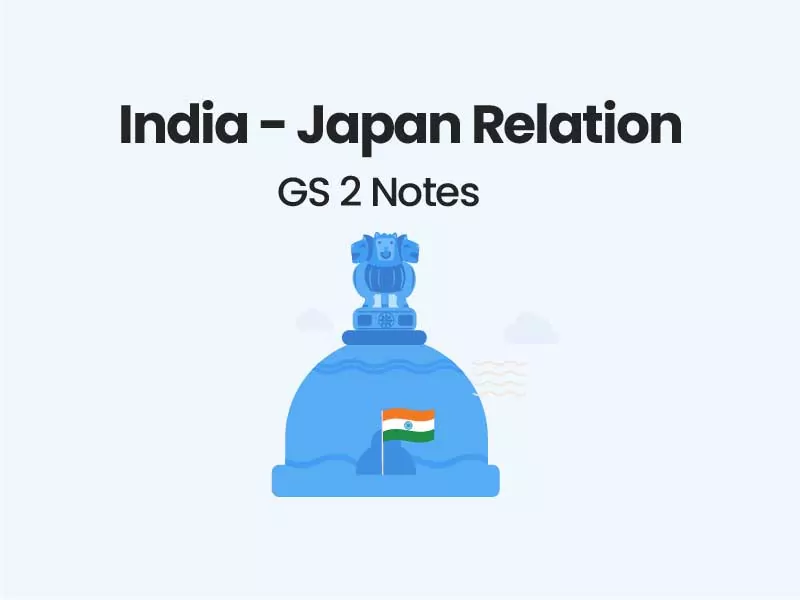Companion@360 → 7 Month programme to sharpen your writing skills → REGISTER NOW

India Japan Relation
The friendship between India and Japan has a long history rooted in spiritual affinity and strong cultural and civilization ties dating back to the visit of Indian monk Bodhisena in 752 A.D.
Throughout the various phases of history since contacts between India and Japan began some 1400 years ago, the two countries have never been adversaries
Bilateral ties have been singularly free of any kind of dispute – ideological, cultural, or territorial.
It is unique and one of warmth emanating from generous gestures and sentiments of standing by each other at times of need.
India-Japan Relation – Background
India and Japan established diplomatic relations in 1952.
Japan was among the few countries that unconditionally bailed India out of the balance of payment crisis in 1991, which strengthened the relation between the two countries.
A qualitative shift in India-Japan relations with the establishment of the ‘Global Partnership’ between the two sides in 2000
Further in 2006, both sides established ‘Strategic and Global Partnership’ in 2006.
A Comprehensive Economic Partnership Agreement (CEPA) between Japan and India was concluded in 2011.
- In 2014, this bilateral relation was upgraded to ‘Special Strategic and Global Partnership’.
Japan and India are partners in peace, with a common interest in and complementary responsibility for promoting the security, stability, and prosperity of Asia as well as in advancing international peace and equitable development.
Since diplomatic relations between India and Japan were established in 1952, the two countries have enjoyed cordial relations based on trade and economic and technical cooperation.
Areas of Cooperation
- Economic Cooperation – Japan is regarded as a key partner in India’s economic transformation.
- The Comprehensive Economic Partnership Agreement (CEPA) has helped in boosting bilateral trade.
- Japan has been one of the biggest sources of investment flows into India.
- A Currency Swap Agreement of $75 billion was signed recently.
- Developmental Assistance through Huge Infrastructure Projects – Japan has been a leading financial donor in the form of ODA (Official Development Assistance) to India.
- Japan supports India’s mega infrastructure projects like the Delhi-Mumbai Freight Corridor, Delhi-Mumbai Industrial Corridor, etc
- Japan has promised to undertake several projects in the North East region under North East Forum.
- Defence Cooperation – India and Japan are partners in the recently formed Quad Security Dialogue.
- India and Japan signed an “Acquisition and Cross-Servicing Agreement” that would allow the militaries of the two countries to exchange supplies and services on a reciprocal basis.
- Trilateral naval exercise called Exercise Malabar involving the United States, Japan and India is being carried on continuous basis.
- Strategic Interests – Looming presence of China has led to the convergence of economic and strategic imperatives, especially in the India-Pacific region
- Both countries share similar interest in Indo-Pacific and calls for a free, open, transparent, rule based and inclusive Indo pacific region.
- The Act East Forum, established in 2017, aims to provide a platform for India-Japan collaboration under the rubric of India’s “Act East Policy” and Japan’s “Free and Open Indo-Pacific Vision”.
- Global Partnership – both countries support each other at UNSC, Climate Change conferences, Disaster Risk management, SDG’s, etc
- Japan and India are working together to realize the reform of Security Council at the earliest.
- Technological Cooperation – “India-Japan Digital Partnership” (I-JDP) was launched in October 2018, focusing more on Digital ICT Technologies.
- establishment of three India-Japan Joint Laboratories in the area of ICT (AI, IoT and Big Data).
- Space Cooperation – India and Japan conducted their first Annual Bilateral Space Dialogue, for enhancing bilateral cooperation in outer-space.
- Agreement on technological collaboration between their respective agencies in the Joint Lunar Polar Exploration Mission.
- Asia-Africa Growth Corridor (AAGC) – an economic cooperation agreement envisaging a closer engagement between Asia and Africa for “Sustainable and Innovative development”.
- Twinning Program – As of now 7 Indian states and 3 sister cities/regions have partnered with Japanese prefectures and cities through MoUs to cooperate under diverse sectors.
Read Full GS Notes
Weaknesses in India-Japan Relation
- Low Trade Volume – In spite of CEPA, India Japan trade it has not produced the anticipated results.
- Bilateral trade has steadily declined since 2013.
- Moreover, India has a high Trade Deficit with Japan.
- Diverging interests – with respect to economic issues like on E-commerce rules (Osaka track), Regional Comprehensive Economic Partnership, etc.
- Limited Defence Cooperation – There is hardly any exchange or procurement of defense equipment or technology from Japan
- Chinese dominance – Despite converging interests of Japan and India, trade with China represents more than 20% of Japan’s total trade.
- Both countries do not have a specific China policy.
- India-Japan trade languishes at around $15 billion, a quarter of trade with China while Japan-China trade is around $300 billion.
- Lack of concrete actions – on projects like Asia Africa Growth Corridor, despite it being signed in 2017.
- There is a great deal of scepticism on the feasibility of the AAGC itself as well as the nature of the projects embedded in it.
- Other Barriers – India struggling to penetrate the Japanese market because of language barriers, high quality, and service standards.
Way Forward
- Expediating Economic Convergence – Japan is only India’s 12th largest trading partner, and trade volumes between the two stands at just a fifth of the value of India-China bilateral trade.
- Expanding Cooperation – India and Japan need to expand cooperation in sectors such as Cybersecurity and Emerging technologies.
- Issues of India’s insistence on data localisation and reluctance to accede to global cybersecurity agreements such as the Budapest Convention needs to be discussed.
- Strengthening defence ties – There should be more exchange of defence equipment and technologies.
- Cooperation on defence equipment and technology holds immense scope and potential for strengthening technological capability and industrial infrastructure through joint efforts between the public and private sectors.
- Expedite implementation of AAGC project – India needs to change its style of implementing projects abroad, most of which have been plagued by cost and time over-runs.
- Enhancing communication and connectivity for unimpeded trade and flow of people, technology, and ideas for shared prosperity.
- Providing more business-friendly environment – as Japan’s interest in India is increasing due to a variety of reasons including India’s large and growing market and its resources, especially the human resources.
Today, India is the largest democracy in Asia and Japan the most prosperous. The evolving geopolitical situation, with the focus shifting decisively towards the Indo-Pacific region and a deeper understanding of the complementarities between the two countries, has further enhanced this partnership.
A strong Indo- Japan will arrest the inconsistency being witnessed in the region thus contributing to peace and prosperity in the Indo Pacific region and the world.
Previous Year Questions
- ‘The time has come for India and Japan to build a strong contemporary relationship, one involving global and strategic partnerships that will have a great significance for Asia and the world as a whole.’ Comment (2019)
- Economic ties between India and Japan while growing in recent years are still far below their potential. Elucidate the policy constraints which are inhibiting this growth (2013)

